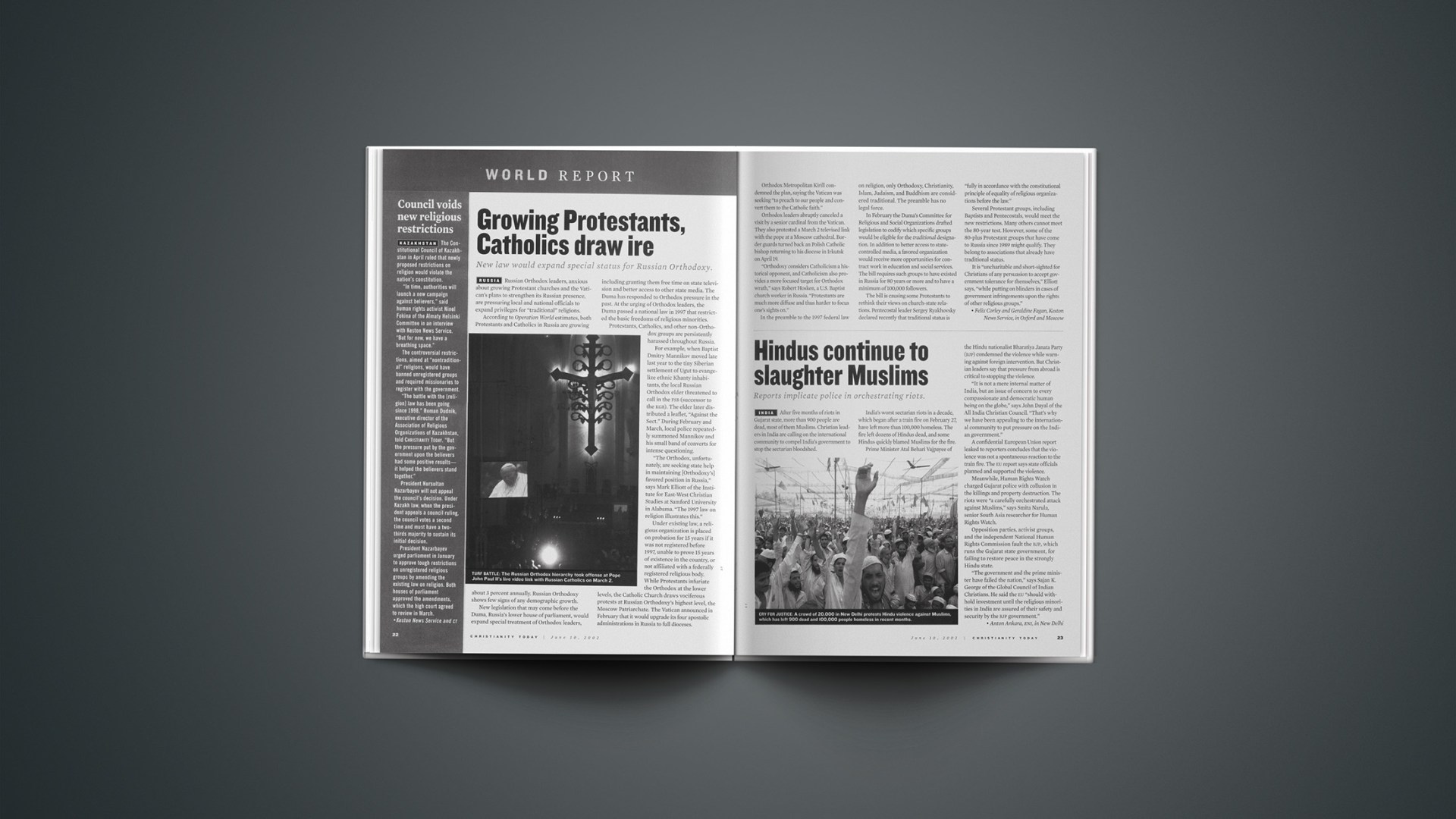Russian Orthodox leaders, anxious about growing Protestant churches and the Vatican’s plans to strengthen its Russian presence, are pressuring local and national officials to expand privileges for “traditional” religions.
According to Operation World estimates, both Protestants and Catholics in Russia are growing about 3 percent annually. Russian Orthodoxy shows few signs of any demographic growth.
New legislation that may come before the Duma, Russia’s lower house of parliament, would expand special treatment of Orthodox leaders, including granting them free time on state television and better access to other state media. The Duma has responded to Orthodox pressure in the past. At the urging of Orthodox leaders, the Duma passed a national law in 1997 that restricted the basic freedoms of religious minorities.
Protestants, Catholics, and other non-Orthodox groups are persistently harassed throughout Russia.
For example, when Baptist Dmitry Mannikov moved late last year to the tiny Siberian settlement of Ugut to evangelize ethnic Khanty inhabitants, the local Russian Orthodox elder threatened to call in the FSB (successor to the KGB). The elder later distributed a leaflet, “Against the Sect.” During February and March, local police repeatedly summoned Mannikov and his small band of converts for intense questioning.
“The Orthodox, unfortunately, are seeking state help in maintaining [Orthodoxy’s] favored position in Russia,” says Mark Elliott of the Institute for East-West Christian Studies at Samford University in Alabama. “The 1997 law on religion illustrates this.”
Under existing law, a religious organization is placed on probation for 15 years if it was not registered before 1997, unable to prove 15 years of existence in the country, or not affiliated with a federally registered religious body. While Protestants infuriate the Orthodox at the lower levels, the Catholic Church draws vociferous protests at Russian Orthodoxy’s highest level, the Moscow Patriarchate. The Vatican announced in February that it would upgrade its four apostolic administrations in Russia to full dioceses.
Orthodox Metropolitan Kirill condemned the plan, saying the Vatican was seeking “to preach to our people and convert them to the Catholic faith.”
Orthodox leaders abruptly canceled a visit by a senior cardinal from the Vatican. They also protested a March 2 televised link with the pope at a Moscow cathedral. Border guards turned back an Polish Catholic bishop returning to his diocese in Irkutsk on April 19.
“Orthodoxy considers Catholicism a historical opponent, and Catholicism also provides a more focused target for Orthodox wrath,” says Robert Hosken, a U.S. Baptist church worker in Russia. “Protestants are much more diffuse and thus harder to focus one’s sights on.”
In the preamble to the 1997 federal law on religion, only Orthodoxy, Christianity, Islam, Judaism, and Buddhism are considered traditional. The preamble has no legal force.
In February the Duma’s Committee for Religious and Social Organizations drafted legislation to codify which specific groups would be eligible for the traditional designation. In addition to better access to state-controlled media, a favored organization would receive more opportunities for contract work in education and social services. The bill requires such groups to have existed in Russia for 80 years or more and to have a minimum of 100,000 followers.
The bill is causing some Protestants to rethink their views on church-state relations. Pentecostal leader Sergey Ryakhovsky declared recently that traditional status is “fully in accordance with the constitutional principle of equality of religious organizations before the law.”
Several Protestant groups, including Baptists and Pentecostals, would meet the new restrictions. Many others cannot meet the 80-year test. However, some of the 80-plus Protestant groups that have come to Russia since 1989 might qualify. They belong to associations that already have traditional status.
It is “uncharitable and short-sighted for Christians of any persuasion to accept government tolerance for themselves,” Elliott says, “while putting on blinders in cases of government infringements upon the rights of other religious groups.”
Copyright © 2002 Christianity Today. Click for reprint information.
Related Elsewhere
Related Christianity Today articles are archived in our Eastern Orthodoxy section and Russia World Report.
Recent news coverage includes:
Russian Orthodox leader wants Russian students to learn about Orthodox ethics—Associated Press (May 23, 20020
Rift Grows as Russian Orthodox Church Rebukes Vatican—The Washington Post (Feb. 14, 2002)
Eastern Orthodox leaders tussle as Russian power ebbs—The Christian Science Monitor (Jan. 7 2002)










